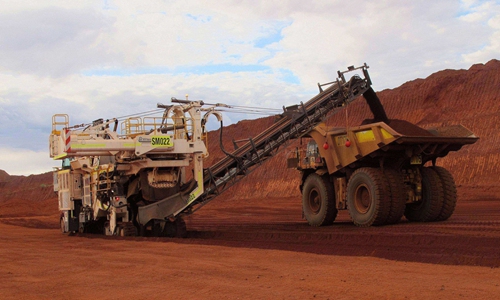Just about one year after Scott Morrison’s government decided to further sour China-Australia ties by calling for a weapons-inspector style investigation into COVID-19’s origins while China was in the midst of containing the novel coronavirus, Chinese ports are beginning to receive hundreds of thousands of tons of coal and a full shipload of iron ore from Sierra Leone, a sign that does not bode well for Australia, as it shows how easy China could replace Australia with alternative import sources, even for iron ore and coal, a Chinese observer told the Global Times on Saturday.
The first batch of 160,000 tons of seaborne coal from South Africa, weighing 2,387 tons, was loaded onto trains heading for Nanning, the capital of South China’s Guangxi Zhuang Autonomous Region on Thursday, a local media outlet reported.
The coal shipment, arriving after a voyage of over 20 days, is the first load of imports by China from South Africa in five years.
The news of the coal shipment follows a news release posted by the Chinese Embassy in Sierra Leone last week, which said a ship loaded with iron ores mined by the Kingho New Tonkolili Iron Ore Project in the West African country, the very first shipment for the new project, left the Port of Pepel and was heading toward China on January 29.
Chinese analysts closely following China-Australia relations said these two developments are clearly aimed at tackling China’s overreliance on coal and iron ore resources from Australia, after a winter of shortage woes for thermal coal and recent runaway iron ore prices sent renewed alerts to Chinese policymakers.
Song Wei, an associate research fellow at the Chinese Academy of International Trade and Economic Cooperation, said despite China’s overreliance on Australian iron ore and coal, which has caused quite some hiccups in the past months, recent shipments of the important materials from alternative source countries showed that it is easy for China to replace Australia as its import source.
“China’s cooperation with developing countries has been rapidly expanding in recent years, and many of these countries are rich in natural resources and are seeking to achieve economic development and growth themselves via trade,” Song said.
Chinese experts told the Global Times that China needs three to five years to invest and develop in African iron ore mines, but some investment projects long started before China-Australian ties soured in 2020.
Despite it being easy for China to replace Australia with alternative trading partners, it will be difficult for Australia, on the other hand, to find alternative exports market to recoup its losses from the Chinese market, experts said.
Australia posted a trade and services surplus of A$72.7 billion ($55.47 billion), an increase of A$5.2 billion on the surplus of A$67.5 billion recorded in 2019 in its balance on goods and services for 2020, data from the Australian Bureau of Statistics showed on Thursday.
However, after a year of trade tensions with China, its largest trading partner, and with the Morrison government choosing to back the Trump administration’s anti-China campaign, which ultimately only damaged its relations with China, some sectors are starting to feel the impact of strained bilateral ties.
Wine exports were effectively wiped out in December after China imposed a temporary tariff amid an ongoing anti-dumping investigation, the Wine Australia report showed.
Impacted by a deteriorating China-Australia relationship, China’s imports from Australia saw an annual decline of 5.3 percent in US dollar terms, according to Chinese customs data from mid-January.
Australian farmers also warned that the country’s trade dispute with China and supply chain disruptions linked to the pandemic will cost the industry $28 billion over the next decade, the Financial Times reported on Friday.
Equally at risk is Australia’s services sector, which generates almost as much revenue as the minerals exports for Down Under, Song said.
China’s Ministry of Education issued a fresh warning on Friday to students studying in Australia following recent attacks on Chinese in the country and common COVID-19 outbreaks, a move that experts believe could be a result of damaged and still deteriorating China-Australia relations.
File photo: An FMG iron ore mining site in Australia Photo: cnsphoto




